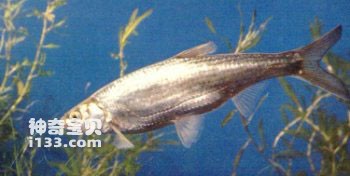Hemiculter leucisculus belongs to the order Cypriniformes, Cyprinidae, Hemiculinae subfamily, and the genus Hemiculterus. Commonly known as: Tiao, minnow, Diaozi, white minnow, basket knife, Youdiaozi. English name: White semiknife carp.
The body is slender and flat on the sides, the back profile is straight, almost in a straight line, the abdominal profile is slightly curved and convex, and there is an obvious ventral rib from the base of the pectoral fin to the anus. The head is pointed and slightly triangular. In the oral end position, the oral cleft slopes upward. The lateral line is complete, bending sharply downward above the pectoral fin at an angle, running along the ventral side to the base of the anal fin and then bending upward again, and then along the midline of the caudal peduncle directly to the base of the caudal fin. The dorsal fin has smooth hard spines; the caudal fin is deeply forked, and the lower lobe is slightly longer than the upper lobe. The whole body is silvery white, the back of the body is slightly blue-gray, the edge of the tail fin is gray-black, and white beads appear on the head of the male fish during the reproductive season.

It can grow and reproduce in both still and flowing water. They often live in groups in the upper layers of coastal areas of water bodies and move quickly. From spring to autumn, they like to swim in coastal waters and look for food, while in winter they hide in deep water. Generally, the gonads of fish can mature in 1 winter, but in Northeast China, it takes 2 winters to reach sexual maturity. The body length of the first sexually mature male fish is about 10 cm, and that of the female fish is about 11.5 cm. The reproductive season is generally from May to June, and extends to July in Northeast China. The number of eggs conceived is 08,000-18,000. The spawning site is located in a shallow water area with slow or still water, and the eggs are developed by adhering to aquatic plants or gravel. It is an omnivorous fish, and its food composition is mainly composed of algae. In addition, there are also higher plant detritus, crustaceans, oligochaetes, aquatic insects, etc. Young fish mainly feed on zooplankton.
It is extremely widely distributed. In addition to the western plateau area, this fish is found in natural water bodies such as rivers and lakes from Hainan Island to the northeast. It is also distributed in Russia, North Korea and Vietnam.
It is a small economic fish. They are small, generally 7-14 cm in length, 3.5-31.5 g in weight, and can reach up to 18.5 cm in weight, 90.6 g in weight. It has an extremely wide distribution, strong fecundity, rapid growth, and is omnivorous. The yield in natural water bodies is quite abundant. If produced according to the canning method of sardines, it is an excellent and valuable raw material. The whole fish is used as medicine and used fresh. It has the effect of warming the stomach and is mainly used to treat cold diarrhea.
animal tags:
We created this article in conjunction with AI technology, then made sure it was fact-checked and edited by a Animals Top editor.